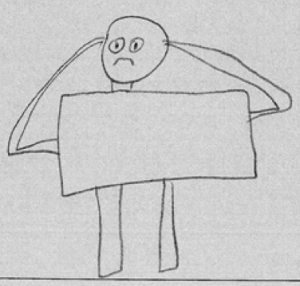Building pupil confidence after a bereavement
John was in year 5. He lived alone with his father. His step-mother died about a year before I met him and his step siblings lived away. He did not know his birth mother, who lived far away. She was very ill and on medication. John’s father had had some issues with depression. John’s attendance had been erratic. He was not making progress in literacy, despite many interventions and school were contemplating alternative provision to mainstream. John related well to adults, but not to his peers. His behaviour had improved since year 4, but he was still easily ‘wound up’ by other children. He got upset at lunchtimes and other unstructured times. He struggled to express his feelings accurately. He could say some disturbing things, such as wanting to kill everyone. He did not always read social situations well and others sometimes thought his behaviour was weird. He did not do his homework or read at home. He was often disorganised and did not settle to lessons. He liked to make things and he said he enjoyed school and playing on the computer.
The behaviour target was to get ready for a lesson independently, namely:
- get his book out,
- put the date at the top of the next clean page
- put his book in the labelled tray at the end of the lesson.
He met his target number of points each week on all, but two occasions, but he did tend to set his target high (often at 10). The two occasions he missed the target, he achieved 8/9 and 9/10 points. The next week he set his target at 6 and achieved 10 points. On week 10 he set himself the target of reaching 11 points!
John and his father attended all 10 sessions, along with the TA and they read together twice a week for all but one of the weeks, when John forgot his folder at school. I showed them how to use the Paired Reading technique, as John was virtually a non-reader. By week four, it was reported that John had made his own book and was writing stories at home about space and he had said, “This is fun.” He was less enthusiastic at home by week seven, but by week eight, he was talking about his stories a lot and liked the different possibilities. He was generalising his skills in the classroom, making up fabulous sentences and becoming more prepared to have a go at writing difficult words rather than just playing it safe. In week four, the Ofsted inspector had been very impressed with John’s work! Apparently he was impressed with the collaborative intervention to support John. In week six, John was given the Star of the Week award.
Teacher’s views
John’s teacher thought John had become much more motivated, got less frustrated when stuck and was much more organised. On the SDQ, most of the behaviours reported stayed the same except for the following changes: restlessness had reduced, being picked on or bullied by others had reduced and thinking things out before acting had increased. Helpfulness if someone is hurt, upset or feeling ill had reduced from certainly true to somewhat true.
John’s views
John felt that reading was a lot easier, more interesting and more fun after the intervention. He really enjoyed reading as a result and he thought he was ok at reading. He began to read the TV guide rather than pushing the remote control. He thought most of the stories were about friendship. It was amazing having his dad come into school for Story Links. He liked the Dr Who story because it would link with a school topic. He thought the sessions had helped him in Big Write, as he had more confidence and he wanted more.
John’s father’s views
Both John and his father loved coming to the sessions. John’s father was pleased to have learned the Paired Reading approach. He thought the stories were brilliant, especially the way everything “comes out” in the stories and how everyone did their bit towards the process.
The main themes of the stories were: companionship, team-work and problem-solving. If John did not have a friend, he made a friend.
Simon the spaceman sat at the controls of his rocket and felt rather lonely. Then his friend teleported there and cheered him up.
Fred the fox trotted through the forest. His fur was sleek and glossy and he looked good, but he was feeling rather worried. He walked to his friend’s house and knocked on the door.
John’s father thought John enjoyed the opportunity to make decisions and the element of control. The intervention had given John confidence and opened up possibilities. He realised he could put his imagination into words and share these. John’s father thought that the story about the robot was particularly significant, as John had a problem with the emotional aspect of the story – it is not practical for a robot to cry.
Rob the robot pressed the buttons on the machine. It was hard to tell what he was feeling. He could not smile. He could not cry. A dribble of oil ran down his face. When Rob pressed the buttons, the machine moved out of control. He started to panic as all the lights flashed on and off. He pressed every button he could find.
The more he panicked, the more oil came out of his eye. He looked as if he was crying.
The boss was the chaos and panic. He noticed the oil leak and flashing lights. The boss realised he had a malfunction. The boss re-booted the robot and re-booted the machine. Everything began to work again. The boss asked Rob what he was doing wrong. Did he need any help?
Rob said, “I just wanted a drink of Coke and seemed to press the button for chocolate instead.” The boss was shocked. He didn’t realise that Rob could speak. The boss realised that, instead of waiting for oil leaks or malfunctions, he could ask Rob for a report. Rob could not smile. He could not cry, but he could tell the boss what was wrong in words.
John loved the last three stories, as the character, Professor Pim (Dr Who) could do anything. He liked the story having the same character. John’s father thought the intervention had had a positive effect on John: his reading had improved, his confidence had increased and his understanding that he needed to finish a task had improved. There had been a very significant improvement on John’s reading: he was now more interested in words and had a better understanding of what he read. Once an idea was written down, it was there for good. John could now create characters. There was some improvement in his awareness of others’ feelings.
John’s father thought that Story Links was a fun way of learning and could help parents become closer to their child and how they think. He summed it up as “Just bloody good.”
Written by Jacqueline Batchelor
Note: All names in the case studies have been changed and permissions given by parents and pupils

